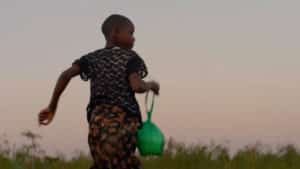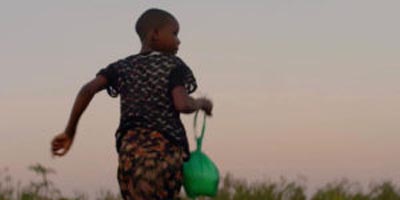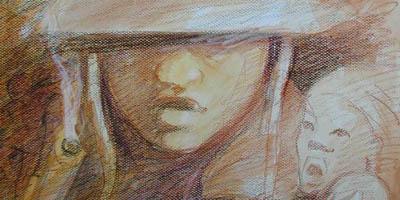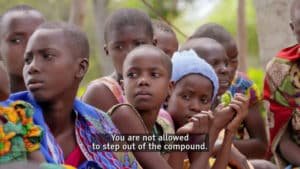A discussion with Giselle Portenier, director of the touching documentary In The Name Of Your Daughter
In Tanzania, “cutting season” is the six weeks starting in December when girls are often forced to undergo female genital mutilation*, even though this nonreligious cultural practice is prohibited in the country. Giselle Portenier, an award-winning journalist and filmmaker who has consistently focused on human rights, especially the rights of women and children, decided to make female genital mutilation her fight and to sensitize the world through a documentary. In The Name Of Your Daughter follows several Tanzanian girls in their desire to escape from being cut.
We met the director on the occasion of the Montreal International Black Film Festival this October. “A story of courage and hope” is the subtitle of this film about girls fleeing “cutting season” in Tanzania and what the filmmaker calls “the worst systematic human rights abuse committed against girls and women in the world today”.
The origin of the movie
In The Name Of Your Daughter is not a Hollywood movie. Giselle Portenier chose to speak about female genital mutilation in Tanzania in her film three years ago after receiving a Google alert about a woman, Rhobi Samwelly, saving girls from cutting. Portenier considered the woman to be inspirational and brave, and thought it important to give visibility to her fight and a voice to the young women in Tanzania. In the movie we are stunned by the maturity of these little girls who really wanted their voices heard. “I promised that I would bring them the film and I did, and they loved it, seeing themselves, laughing together”.
A taboo but widespread phenomenon
 The World Health Organization describes female genital mutilation as any procedure that injures the female genital organs for non-medical reasons. Girls undergoing this mutilation can then be exchanged for more cows when they get married than if they were not cut. Therefore, the family is often behind this rite of passage.
The World Health Organization describes female genital mutilation as any procedure that injures the female genital organs for non-medical reasons. Girls undergoing this mutilation can then be exchanged for more cows when they get married than if they were not cut. Therefore, the family is often behind this rite of passage.
“The economic aspect in female genital mutilation can’t be underestimated,” Portenier says, with the girl being reduced to a sexual commodity. However, female genital cutting has significant physical and psychological consequences for these girls, who are sometimes very young: severe pain, excessive bleeding, infections, post-traumatic stress disorder, anxiety, depression and, sometimes, death.
“I made my film especially to give the children a voice,” she says. “I have been a human rights journalist all my life and I made films on child slavery, sex trafficking, etc., but when I heard about female genital mutilation, I knew it was one topic that I had to attack.” Indeed, she deplores the “huge silence” around this problem in Canada, where she says that although this is child abuse, there is “a misguided sense of political correctness, where people think we shouldn’t be criticising another culture.”
Portenier insists that female genital mutilation is not required by any religion. The composition of girls in the Safe House in her film is actually one third Christian, one third Muslim and one third local religions.
It is also something that affects Western countries. There are more than 80,000 people in Canada who were cut as a child. The director says that she deplores the lack of involvement of the Canadian government and its failure to protect the girls. “Our government is not tackling this in any significant way, whereas in the United Kingdom they have protocols to save girls, with systems in place to protect children from being taken abroad by their parents, there are helplines one which you can call for help and there are clinics to help survivors of female genital mutilation. We do not have any of that in Canada.”
A terrible choice
 In The Name Of Your Daughter follows the stories of “the most courageous girls in the world,” children in northern Tanzania who risk their lives to defy custom. “These girls, some as young as eight, are running away from home, leaving everything and everyone they love behind to save themselves from female genital mutilation and avoid being sold off into a child marriage,” Portenier.
In The Name Of Your Daughter follows the stories of “the most courageous girls in the world,” children in northern Tanzania who risk their lives to defy custom. “These girls, some as young as eight, are running away from home, leaving everything and everyone they love behind to save themselves from female genital mutilation and avoid being sold off into a child marriage,” Portenier.
Without directly showing this rite of passage, the documentary suggests the harshness of this moment for these girls, their fear, their anguish, their sadness to have to go against the will of their entire family. “It is a terrible choice these girls have to make. They have to choose between their families and themselves and no child should have to make that choice that is why it has to stop”.
The film shows how sensitive the subject is in Tanzania through the scenes of meetings between children and their parents. The tension between the mothers and their daughters is particularly striking and touching and highlights the suffering that these little girls have to endure by choosing between their family and their freedom.
Local activism: portrait of a brave woman
The film features a local activist, Rhobi Samwelly, who tries to change attitudes and welcome girls to a place she has created, the Safe House, which offer a safe place for girls refusing female genital mutilation. In this place, girls attend classes during which Samwelly builds their confidence and independence.
“Rhobi is such a passionate and strong person,” Portenier says. “There are other Safe Houses in Africa, at least one more in Tanzania, but not many because the international community does not really support them. They think that girls should not be separated from their families, but if you ask the children about that they say that they prefer to be separate from their family than female genital cutting.”
In this sense, one of the key phrases of the film was pronounced by a 13-year-old girl, Janet: “Parents have no right to cut their daughters. They only have the right to educate them and help them to fulfill their dreams.”
For Portenier, it is local activists like Samwelly who can drive a change, even if it cannot be done without help. “That is my role as a filmmaker and a human rights journalist, to amplify the voices of the people on the ground who are risking their lives to make change. In Tanzania, the authorities are actually behind Rhobi. Since the film has come out she has got more support from the local and national governments and from the international community.”
#MYISSUETOO
The director is committed to the European campaign #MYISSUETOO and would like this campaign to take on a greater scope, so that governments put in place strong laws to prevent female genital mutilation. “I think female genital mutilation is my issue too, your issue too, it is everybody’s issue because you probably all know somebody who has been through it.”
* Some people prefer to use the the term “female genital cutting” instead of “female genital mutilation” because it is often a part of the culture in countries where it is practiced, and not considered a “mutilation”.
Héloïse Pimont-Farge and Camille Loyer
Students at Sciences Po Lille, France, Héloïse and Camille were interns with Social Justice Connection from September to December 2018.





